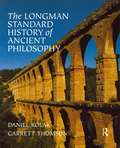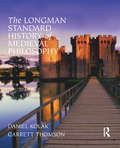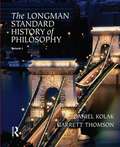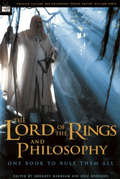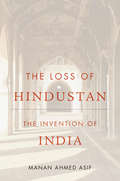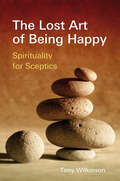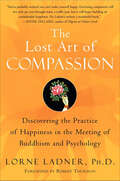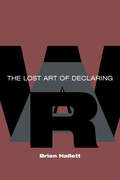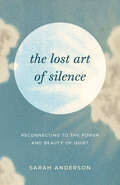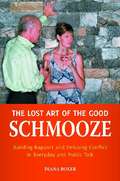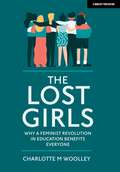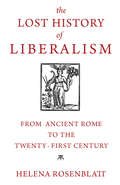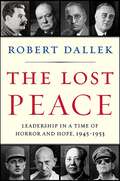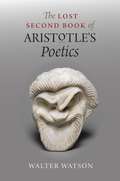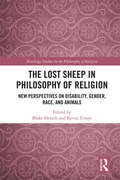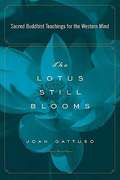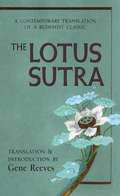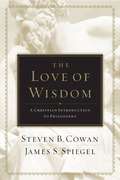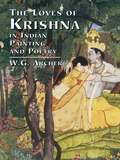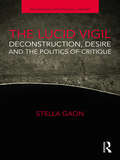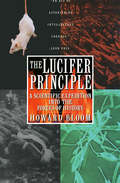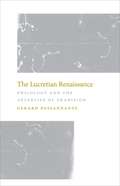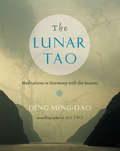- Table View
- List View
The Longman Standard History of Ancient Philosophy
by Daniel Kolak Garrett ThomsonWith selections of philosophers from Thales to Sextus Empiricus, this new anthology provides significant learning support and historical context for the readings along with a wide variety of pedagogical assists. Biographical headnotes, reading introductions, study questions, and special “Prologues” and “Philosophical Overviews” help students understand and appreciate the philosophical concepts under discussion. “Philosophical Bridges" discuss how the work of earlier thinkers would influence philosophers to come, and place major movements in a contemporary context showing students how the schools of philosophy interrelate and how various philosophies apply to the world today. In addition to this volume of Ancient Philosophy, a comprehensive survey of the whole of Western philosophical history and other individual volumes for each of the major historical eras are also available for specialized courses.
The Longman Standard History of Medieval Philosophy
by Daniel Kolak Garrett ThomsonWith selections of philosophers from Plotinus to Bruno, this new anthology provides significant learning support and historical context for the readings along with a wide variety of pedagogical assists. Featuring biographical headnotes, reading introductions, study questions, as well as special “Prologues” and “Philosophical Overviews,” this anthology offers a unique set of critical thinking promtps to help students understand and appreciate the philosophical concepts under discussion. “Philosophical Bridges" discuss how the work of earlier thinkers would influence philosophers to come and place major movements in a contemporary context, showing students how the schools of philosophy interrelate and how the various philosophies apply to the world today. In addition to this volume of Medieval Philosophy, a comprehensive survey of the whole of Western philosophical history and other individual volumes for each of the major historical eras are also available for specialized courses.
The Longman Standard History of Philosophy
by Daniel Kolak Garrett ThomsonThis anthology provides significant learning support and historical context with biographical introductions, topic "Prologs," reading introductions and "Philosophical Overviews," "Philosophical Bridges" describing historical influences, study questions, and "Codas" placing major movements in contemporary context.
The Lord of the Rings and Philosophy: One Book to Rule Them All
by Eric Bronson Gregory BasshamThe Lord of the Rings is intended to be applicable to the real world of relationships, religion, pleasure, pain, and politics.<P><P> Tolkien himself said that his grand tale of wizards, orcs, hobbits, and elves was aimed at truth and good morals in the actual world.Analysis of the popular appeal of The Lord of the Rings (on websites and elsewhere) shows that Tolkien fans are hungry for discussion of the urgent moral and cosmological issues arising out of this fantastic epic story.Can political power be wielded for good, or must it always corrupt? Does technology destroy the truly human? Is it morally wrong to give up hope? Can we find meaning in chance events?In The Lord of the Rings and Philosophy, seventeen young philosophy professors, all of them ardent Tolkien fans and most of them contributors to the four earlier volumes in the Popular Culture and Philosophy series, address some of these important issues and show how clues to their solutions may be found in the imaginary world of Middle-earth. The book is divided into five sections, concerned with Power and the Ring, the Quest for Happiness, Good and Evil in Middle-earth, Time and Mortality, and the Relevance
The Loss of Hindustan: The Invention Of India
by Manan Ahmed AsifA field-changing history explains how the subcontinent lost its political identity as the home of all religions and emerged as India, the land of the Hindus.Did South Asia have a shared regional identity prior to the arrival of Europeans in the late fifteenth century? This is a subject of heated debate in scholarly circles and contemporary political discourse. Manan Ahmed Asif argues that Pakistan, Bangladesh, and the Republic of India share a common political ancestry: they are all part of a region whose people understand themselves as Hindustani. Asif describes the idea of Hindustan, as reflected in the work of native historians from roughly 1000 CE to 1900 CE, and how that idea went missing.This makes for a radical interpretation of how India came to its contemporary political identity. Asif argues that a European understanding of India as Hindu has replaced an earlier, native understanding of India as Hindustan, a home for all faiths. Turning to the subcontinent’s medieval past, Asif uncovers a rich network of historians of Hindustan who imagined, studied, and shaped their kings, cities, and societies. Asif closely examines the most complete idea of Hindustan, elaborated by the early seventeenth century Deccan historian Firishta. His monumental work, Tarikh-i Firishta, became a major source for European philosophers and historians, such as Voltaire, Kant, Hegel, and Gibbon during the eighteenth and nineteenth centuries. Yet Firishta’s notions of Hindustan were lost and replaced by a different idea of India that we inhabit today.The Loss of Hindustan reveals the intellectual pathways that dispensed with multicultural Hindustan and created a religiously partitioned world of today.
The Lost Art of Being Happy
by Tony WilkinsonArguing that spirituality is not about religion but about living happily, this guidebook offers advice on the skills of the inner life-the mind and emotions-that are needed for a life of gladness. This examination discusses the requirements for happiness, explores their nature, and shows that mastering a set of five of them leads to bliss. The exercises in this resource are offered to spiritual seekers as a path towards happiness and emphasize that personal elation is not caused by external events, but by mastering the skills of the inner life.
The Lost Art of Compassion: Discovering the Practice of Happiness in the Meeting of Buddhism and Psychology
by Lorne LadnerA practical guide to cultivating compassion in those difficult moments of daily life: “Inspiring for all of us, therapists and patients alike.” —Mark Epstein, MD, author of Thoughts Without a ThinkerCompassion is often seen as a distant, altruistic ideal cultivated by saints, or as an unrealistic response of the naively kind-hearted. Seeing compassion in this way, we lose out on experiencing the transformative potential of one of our most neglected inner resources.Dr. Lorne Ladner rescues compassion from this marginalized, idealized place, showing how its practical application in our life can be a powerful force in achieving happiness. Combining the wisdom of Tibetan Buddhism and Western psychology, Ladner presents clear, effective practices for cultivating compassion in daily living.“[A] realistic, manageable approach to dispelling bitterness and anger and replacing it with empathy and patience.” —Publishers Weekly“You’ve probably noticed you can’t make yourself happy. Exercising compassion will not only get you through many a traffic jam . . . it will begin building an unshakeable happiness . . . a wonderful book.” —Annie Dillard, author of Pilgrim at Tinker CreekIncludes a foreword by Robert Thurman
The Lost Art of Declaring War
by Brien HallettHistorically, it has been assumed that war is violence and declarations of war are simply public announcements that serve to initiate combat. Brien Hallett denies both assumptions and claims that war is policy, not violence. The Lost Art of Declaring War analyzes the crucial differences between combat and war and convincingly argues that the power to "declare" war is in actuality the power to compose a text, draft a document, write a denunciation. Once written, the declaration then serves three functions: to articulate the political purposes of the war, to guide and direct military operations, and to establish the boundary between justified combat and unjustified devastation. Hallett sounds a clarion call urging the people and their representatives to take up the challenge and write fully reasoned declarations of war. Then, and only then, can a civilized nation like the United States lay claim to being fully democratic, not only in peacetime, but in wartime as well.
The Lost Art of Silence: Reconnecting to the Power and Beauty of Quiet
by Sarah AndersonA unique celebration of silence—in art, literature, nature, and spirituality—and an exploration of its ability to bring inner peace, widen our perspectives, and inspire the human spirit in spite of the noise of contemporary life.Silence is habitually overlooked—after all, throughout our lives, it has to compete with the cacophony of the outside world and our near-constant interior dialogue that judges, analyzes, compares, and questions. But, if we can get past this barrage, there lies a quiet place that&’s well worth discovering.The Lost Art of Silence encourages us to embrace this pursuit and allow the warm light of silence to glow. Invoking the wisdom of many of the greatest writers, thinkers, contemplatives, historians, musicians, and artists, Sarah Anderson reveals the sublime nature of quiet that&’s all too often undervalued. Throughout, she shares her own penetrating insights into the potential for silence to transform us. This celebration of silence invites us to widen our perspective and shows its power to inspire the human spirit in spite of the distracting noise of contemporary life.
The Lost Art of the Good Schmooze: Building Rapport and Defusing Conflict in Everyday and Public Talk
by Diana Boxer<p>The good schmooze is talk about life itself: the good, the bad, and the ugly--a heartfelt interaction with others--chatting, not "chatting up." The Lost Art of the Good Schmooze: Building Rapport and Defusing Conflict in Everyday and Public Talk is about what to say, when to say it, and how to say it. Full of insights that will prove useful at work, at home, with friends, and just about everywhere else, the book will help readers become tactful schmoozers who can defuse situational tensions and lubricate personal, social, workplace, and political interactions with others. <p>The book is organized around five occasions: schmoozing in social interactions, family schmoozing, schmoozing in the workplace, schmoozing in education, and schmoozing in cross-cultural interactions. Examples of both successful and failed schmoozing are drawn from television, films, news, and everyday life. Hundreds of real-world verbal interactions illustrate how recapturing this lost art can lead to increased harmony in all spheres of life.</p>
The Lost Girls: Why a feminist revolution in education benefits everyone
by Charlotte WoolleyLife for girls is a battle of contrasting expectations, being told you should be 'empowered' but also be a 'good girl', putting others first but still striving for perfection yourself. This conflict, internalizing expectations of an impossible standard, has lead to an explosion in mental-health and anxiety-related disorders in young women. The traditional narrative of education feeds the perception that girls are good. They achieve, work hard, are co-operative. They achieve better grades. But where do these high achievers disappear to? They aren't becoming CEOs, politicians or social leaders. Women are still disproportionately the family carers and domestic managers. This book explores: * research around biological difference, and how our schools encode gendered expectations. * how our curricula can provide role-models as well as modes of thinking, valuing traditionally feminine traits as equal to masculine * using psychological approaches to develop girls' independence. * how school systems and leadership can model approaches to encourage all students to create a gender-balanced environment. With practical questions and suggestions at the end of each chapter, this book is a guide to the research and a tool to help teachers and leaders shape a genuinely empowering school experience for young women.
The Lost Girls: Why a feminist revolution in education benefits everyone
by Charlotte WoolleyLife for girls is a battle of contrasting expectations, being told you should be 'empowered' but also be a 'good girl', putting others first but still striving for perfection yourself. This conflict, internalizing expectations of an impossible standard, has lead to an explosion in mental-health and anxiety-related disorders in young women. The traditional narrative of education feeds the perception that girls are good. They achieve, work hard, are co-operative. They achieve better grades. But where do these high achievers disappear to? They aren't becoming CEOs, politicians or social leaders. Women are still disproportionately the family carers and domestic managers. This book explores: * research around biological difference, and how our schools encode gendered expectations. * how our curricula can provide role-models as well as modes of thinking, valuing traditionally feminine traits as equal to masculine * using psychological approaches to develop girls' independence. * how school systems and leadership can model approaches to encourage all students to create a gender-balanced environment. With practical questions and suggestions at the end of each chapter, this book is a guide to the research and a tool to help teachers and leaders shape a genuinely empowering school experience for young women.
The Lost History of Liberalism: From Ancient Rome to the Twenty-First Century
by Helena RosenblattThe changing face of the liberal creed from the ancient world to todayThe Lost History of Liberalism challenges our most basic assumptions about a political creed that has become a rallying cry—and a term of derision—in today’s increasingly divided public square. Taking readers from ancient Rome to today, Helena Rosenblatt traces the evolution of the words “liberal” and “liberalism,” revealing the heated debates that have taken place over their meaning.In this timely and provocative book, Rosenblatt debunks the popular myth of liberalism as a uniquely Anglo-American tradition centered on individual rights. She shows that it was the French Revolution that gave birth to liberalism and Germans who transformed it. Only in the mid-twentieth century did the concept become widely known in the United States—and then, as now, its meaning was hotly debated. Liberals were originally moralists at heart. They believed in the power of religion to reform society, emphasized the sanctity of the family, and never spoke of rights without speaking of duties. It was only during the Cold War and America’s growing world hegemony that liberalism was refashioned into an American ideology focused so strongly on individual freedoms.Today, we still can’t seem to agree on liberalism’s meaning. In the United States, a “liberal” is someone who advocates big government, while in France, big government is contrary to “liberalism.” Political debates become befuddled because of semantic and conceptual confusion. The Lost History of Liberalism sets the record straight on a core tenet of today’s political conversation and lays the foundations for a more constructive discussion about the future of liberal democracy.
The Lost Peace: Leadership in a Time of Horror and Hope, 1945–1953
by Robert Dallek"Robert Dallek brings to this majestic work a profound understanding of history, a deep engagement in foreign policy, and a lifetime of studying leadership. The story of what went wrong during the postwar period…has never been more intelligently explored." —Doris Kearns Goodwin, author of the Pulitzer Prize-winning Team of RivalsRobert Dalleck follows his bestselling Nixon and Kissenger: Partners in Power and An Unfinished Life: John F. Kennedy, 1917-1963 with this masterful account of the crucial period that shaped the postwar world. As the Obama Administration struggles to define its strategy for the wars in Afghanistan and Iraq, Dallek's critical and compelling look at Truman, Churchill, Stalin, and other world leaders in the wake of World War II not only offers important historical perspective but provides timely insight on America's course into the future.
The Lost Second Book of Aristotle's Poetics
by Walter WatsonAristotle&’s lost wisdom on comedy and catharsis come to life in this philosopher&’s interpretation of recovered ancient writings.Aristotle&’s Poetics was the first philosophical treatise to propound a theory of literature. But we know that what remains of this important text is incomplete. In the existing material, Aristotle tells us that he will speak of comedy, address catharsis, and give an analysis of what is funny—but these promised chapters are missing. Now, philosopher Walter Watson offers a new interpretation of the lost second book of Aristotle&’s Poetics. A document known as the Tractatus Coislinianus, first recovered in the Biblioteque Nationale in Paris in 1839, appears to be a summary of Aristotle&’s second book. Based on Richard Janko&’s philological reconstruction, Watson mounts a compelling philosophical argument that gives revealing context to this document and demonstrates its hidden meanings. Watson renders lucid and complete explanations of Aristotle&’s ideas about catharsis, comedy, and a summary account of the different types of poetry, ideas that influenced not only Cicero&’s theory of the ridiculous, but also Freud&’s theory of jokes, humor, and the comic. Here, at last, Aristotle&’s lost second book is found again.
The Lost Sheep in Philosophy of Religion: New Perspectives on Disability, Gender, Race, and Animals (Routledge Studies in the Philosophy of Religion)
by Kevin Timpe Blake HerethContemporary research in philosophy of religion is dominated by traditional problems such as the nature of evil, arguments against theism, issues of foreknowledge and freedom, the divine attributes, and religious pluralism. This volume instead focuses on unrepresented and underrepresented issues in the discipline. The essays address how issues like race, sexual orientation, gender identity, disability, feminist and pantheist conceptions of the divine, and nonhuman animals connect to existing issues in philosophy of religion. By staking out new avenues for future research, this book will be of interest to a wide range of scholars in analytic philosophy of religion and analytic philosophical theology.
The Lost World of British Communism
by Raphael Samuel Alison LightThe Lost World of British Communism is a vivid account of the Communist Party of Great Britain. Raphael Samuel, one of post-war Britain's most notable historians, draws on novels of the period and childhood recollections of London's East End, as well as memoirs and Party archives, to evoke the world of British Communism in the 1940s. Samuel conjures up the era when the movement was at the height of its political and theoretical power, brilliantly bringing to life an age in which the Communist Party enjoyed huge prestige as a bulwark for the struggles against fascism and colonialism.
The Lotus Still Blooms
by Joan GattusoThe Lotus Still Blooms is the ideal book for every reader who would like to understand Buddhist principles, but doesn’t know where to start. Eastern wisdom traditions are often baffling for Western minds – where to begin in uncovering the often complicated steps, precepts, concepts and ideas? Aimed at people who are curious about Buddhism and want a basic book that will help them to understand – and apply – Buddhist principles in their life, The Lotus Still Blooms is a practical book that goes through all of the major Buddhist principles, step-by-step, and then shows how to apply them to our busy, hectic lives. Filled with Joan Gattuso’s trademark delightful stories and warmth, as well as exercises to help readers begin using the principles right away, this is a book that will be a welcomed new introduction to this exciting spiritual tradition. .
The Lotus Sutra
by Gene ReevesThe Lotus Sutra is regarded as one of the world's great religious scriptures and most influential texts. It's a seminal work in the development of Buddhism throughout East Asia and, by extension, in the development of Mahayana Buddhism throughout the world. Taking place in a vast and fantastical cosmic setting, the Lotus Sutra places emphasis on skillfully doing whatever is needed to serve and compassionately care for others, on breaking down distinctions between the fully enlightened buddha and the bodhisattva who vows to postpone salvation until all beings may share it, and especially on each and every being's innate capacity to become a buddha. Gene Reeves's new translation appeals to readers with little or no familiarity with technical Buddhist vocabulary, as well as long-time practitioners and students. In addition, this remarkable volume includes the full "threefold" text of this classic.
The Love of Wisdom: A Christian Introduction to Philosophy
by James S. Spiegel Steven B. Cowan Broadman Holman Publishers StaffPhilosophy is defined as the love of wisdom, and college students will certainly admire this Bible-informed introductory level textbook's fun approach to an often heady subject. The Love of Wisdom is made distinct in its engaging style that includes humor and copious popular culture illustrations to heighten reader interest and clarify important concepts. The book even addresses two key topics often omitted by other texts: political philosophy and aesthetics (beauty and the arts).
The Loves of Krishna in Indian Painting and Poetry
by W. G. ArcherThe first book in English to provide a full and clear introduction to the imagery and verse related to one of the most significant of Indian gods. Archer's history of the depiction of Krishna's life and deeds traces the god's many aspects, from warrior to cowherd to prince. 39 plates of illustrations follow.
The Lucid Vigil: Deconstruction, Desire and the Politics of Critique (Psychoanalytic Political Theory)
by Stella GaonStella Gaon provides the first fully philosophical account of the critical nature of deconstruction, and she does so by turning in an original way to psychoanalysis. Drawing on close readings of Freud and Laplanche, Gaon argues that Derridean deconstruction is driven by a normative investment in reason’s psychological force. Indeed, deconstruction is more faithful to the principle of reason than the various forms of critical theory prevalent today. For if one pursues the classical demand for rational grounds vigilantly, one finds that claims to ethical or political legitimacy cannot be rationally justified, because they are undone by logical undecidability. Gaon’s argument is borne out in the cases of Kantian deontology, Deweyan pragmatism, progressive pedagogy, Habermasian moral theory, Levinasian ethics and others. What emerges is the groundbreaking demonstration that deconstruction is impelled by a quasi-ethical critical drive, and that to read deconstructively is to radicalize the emancipatory practice of reason as self-critique. This important volume will be of great value to critical theorists as well as to Derrida scholars and researchers in social and political thought.
The Lucifer Principle: A Scientific Expedition into the Forces of History
by Howard BloomThe Lucifer Priciple is a revolutionary work that explores the intricate relationships among genetics, human behavior, and culture to put forth the thesis that "evil” is a by-product of nature’s strategies for creation and that it is woven into our most basic biological fabric.In a sweeping narrative that moves lucidly among sophisticated scientific disciplines and covers the entire span of the earth’s, as well as mankind’s, history, Howard Bloom challenges some of our most popular scientific assumptions. Drawing on evidence from studies of the most primitive organisms to those on ants, apes, and humankind, the author makes a persuasive case that it is the group, or "superorganism,” rather than the lone individual that really matters in the evolutionary struggle. But, Bloom asserts, the prominence of society and culture does not necessarily mitigate against our most violent, aggressive instincts. In fact, under the right circumstances the mentality of the group will only amplify our most primitive and deadly urges.In Bloom’s most daring contention he draws an analogy between the biological material whose primordial multiplication began life on earth and the ideas, or "memes,” that define, give cohesion to, and justify human superorganisms. Some of the most familiar memes are utopian in nature-Christianity or Marxism; nonetheless, these are fueled by the biological impulse to climb to the top of the heirarchy. With the meme’s insatiable hunger to enlarge itself, we have a precise prescription for war.Biology is not destiny; but human culture is not always the buffer to our most primitive instincts we would like to think it is. In these complex threads of thought lies the Lucifer Principle, and only through understanding its mandates will we able to avoid the nuclear crusades that await us in the twenty-first century.
The Lucretian Renaissance: Philology and the Afterlife of Tradition
by Gerard PassannanteWith The Lucretian Renaissance, Gerard Passannante offers a radical rethinking of a familiar narrative: the rise of materialism in early modern Europe. Passannante begins by taking up the ancient philosophical notion that the world is composed of two fundamental opposites: atoms, as the philosopher Epicurus theorized, intrinsically unchangeable and moving about the void; and the void itself, or nothingness. Passannante considers the fact that this strain of ancient Greek philosophy survived and was transmitted to the Renaissance primarily by means of a poem that had seemingly been lost--a poem insisting that the letters of the alphabet are like the atoms that make up the universe. By tracing this elemental analogy through the fortunes of Lucretius's On the Nature of Things, Passannante argues that, long before it took on its familiar shape during the Scientific Revolution, the philosophy of atoms and the void reemerged in the Renaissance as a story about reading and letters--a story that materialized in texts, in their physical recomposition, and in their scattering. From the works of Virgil and Macrobius to those of Petrarch, Poliziano, Lambin, Montaigne, Bacon, Spenser, Gassendi, Henry More, and Newton, The Lucretian Renaissance recovers a forgotten history of materialism in humanist thought and scholarly practice and asks us to reconsider one of the most enduring questions of the period: what does it mean for a text, a poem, and philosophy to be "reborn"?
The Lunar Tao
by Deng Ming-DaoWe all live our lives by the Sun and the Moon The lunar calendar is a main pillar of Chinese tradition and culture, encompassing many festivals and stories. Though most explorations of Taoism take place within the realm of scripture, exercises, and formal lectures, Deng Ming-Dao looks to the lunar calendar and highlights where these festivals and stories coincide with Taoism, giving readers a renewed and original way into this ancient philosophy. Each day of the lunar year is represented with a reading meditation, original translations, illustrations, and illuminating facts about festivals and traditions, providing readers with the context that gives Taoism such depth and resonance. Unlike any other book, and beautifully illustrated with more than 400 photo-graphs and drawings, The Lunar Tao offers a new way to explore Taoism and shows readers how to include the tenets of Taoism in daily life.
